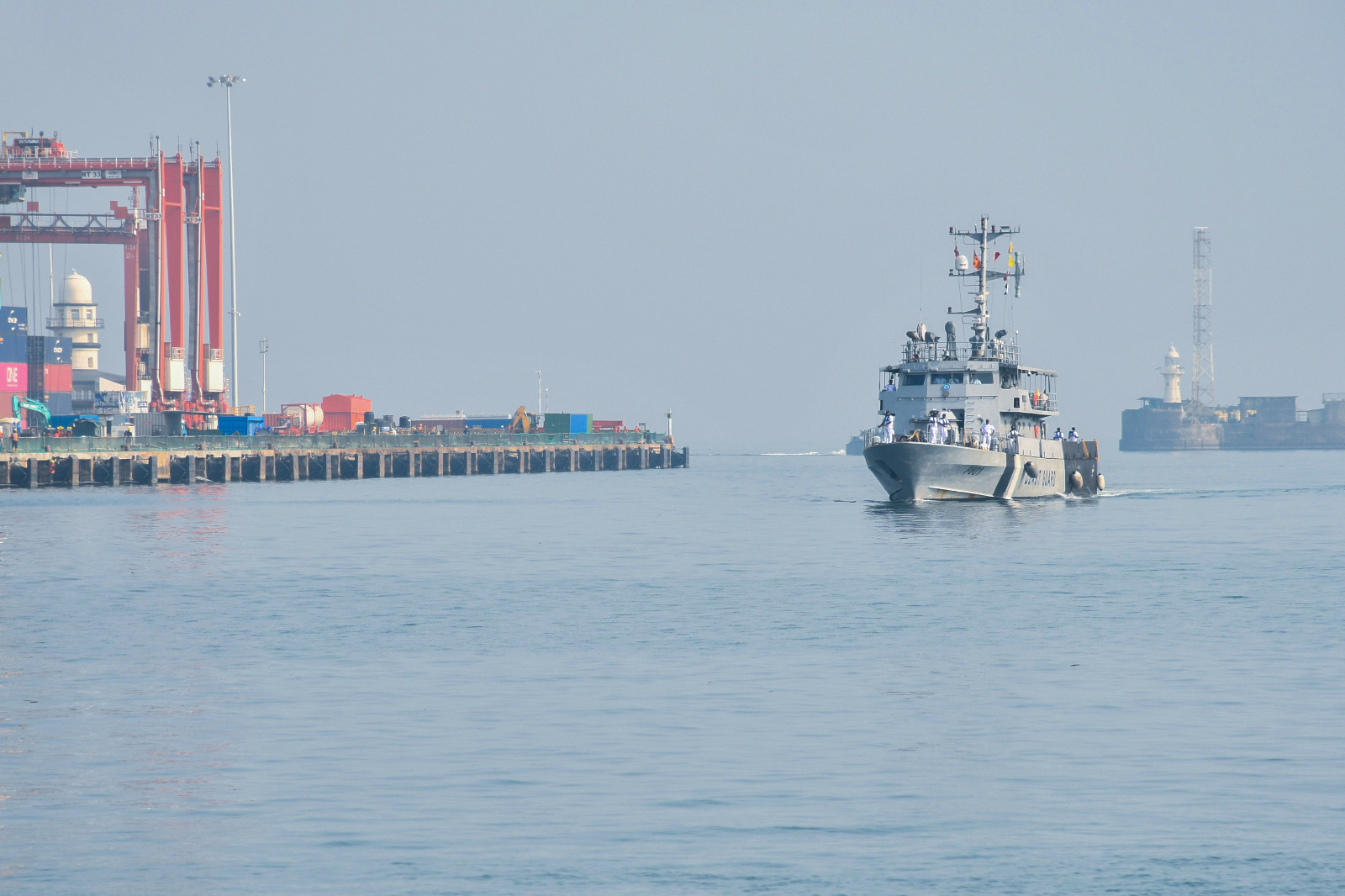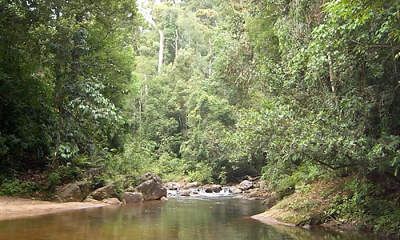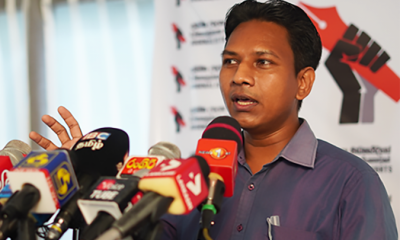News
World Bank under fire for backing project to reap short-term profit at the expense of forests

By Rathindra Kuruwita
Some Forest Conservation Department officials are more interested in building roads and structures inside protected areas than protecting forests, Sajeewa Chamikara of the Movement for Land and Agricultural Reforms (MONLAR) says.
“These officials are not interested in preventing illegal activities inside protected areas or raising the awareness of those who live near these areas, especially around Sinharaja Forest”, he said.
Ecosystem Conservation and Management Project (ESCAMP), a World Bank mission was a case in point, Chamikara said, alleging that it sought to develop forests as tourism centres.
“During the first part of the ESCAMP, forest conservation, officials developed roads at the Kudawa entrance. They constructed a two-kilometre road with a width of 10 feet, through Sinharaja. They even put waterlines in. A large number of freshwater crabs and amphibians lost their habitats and breeding grounds because of these constructions. We don’t see some animals like the Kangaroo lizard and the Sri Lankan green pit viper in that area anymore”, he said.
Chamikara added that the roads constructed under ESCAMP could not even be used by tourists anymore because they were slippery. At certain times forest conservation officials allow vehicles on these roads. “There are earth slips along the road and further constructions have been made to stop this”, he said.
Despite the failure of the first leg of the ESCAMP project, forest conservation officials were trying to build an eight-foot road from another entrance in the Kudawa area to the research centre in the forest, Chamikara said.He said that the proposed road would go through an area that had a lot of ferns and a number of indigenous species.
“There are also many small and micro species in this area as well. We will lose them. When swaths of forests are cleared a number of invasive species find their way into Sinharaja. Plants like Koster’s Curse (Dillenia suffruticosa) have already invaded Sinharaja. Endemic orchids, ferns, moss and many plants in the forest undergrowth have been run over. This also affects animals that depend on these plants. Sinharaja is a very sensitive and interconnected biological hotspot. Change made in one place will affect the entire system,” Chamikara said.
Chamikara said that a similar set of incidents had taken place in the Knuckles Forest Range and a number of endemic species to Knuckles were now slowly becoming extinct. “The World Bank projects like ESCAMP are aimed at short-term profit over long term sustainability,” he said.
“We are not against tourism, which is a vital source of revenue. However, you need to build tourist accommodation outside forests. Extremely sensitive forest areas must not be opened to tourists. We talk a lot about attracting quality tourists who spend a lot of money. There are tourists who spend thousands of dollars a night on nature tourism, but such individuals also like nature. They won’t come into a place where their patronage will lead to environmental destruction”, Chamikara said, adding that Sri Lanka was a party to many UN biodiversity conventions. “Successive governments talk about achieving the Sustainable Development Goals. However, the entire state mechanism is silent when large swaths of highly important forests, catchment areas and biological hot spots are destroyed to create an access way for tourism.
“Soon these access ways will be used by politicians to build hotels inside Sinharaja. We already see that those who embezzled billions of rupees from the people are now spending these moneys to purchase and renovate hotels in highly sensitive environmental areas.”
Chamikara said that the threat to Sinharaja had been increasing in the past few years. In 2020 and 2021, two circulars had been issued by the government, handing over the management of Other State Forests (OSF) to Divisional/District Secretaries, he said.
“These circulars repealed an earlier circular, 05/2001, which had transferred the management of these lands from the Divisional/District Secretaries to the Forest Department. Through circular 1/2020, the OSF were brought under Divisional/Districts Secretaries and circular 1/2021 allowed the officials to survey the OSF and allocate them for development activities. The power these two circulars granted to Divisional/Districts Secretaries has been used by those with political and financial power to clear up forest lands in Sinharaja,” he said.
Minister of Agriculture, Wildlife and Forest Resources Conservation, Mahinda Amaraweera said that he was not aware of this development and would look into it.
News
Maldives Coast Guard Ship Huravee arrives in Colombo

The Maldives Coast Guard Ship Huravee arrived at the Port of Colombo for replenishment purposes on 02 Mar 26. The visiting ship was welcomed by the Sri Lanka Navy (SLN) in compliance with time-honoured naval traditions.
The ship is a 48.9m long Offshore Patrol Vessel which is commanded by Lieutenant Colonel Ahmed Nafiu Mohamed.
Meanwhile, the ship’s crew is scheduled to visit several tourist attractions in the city of Colombo, during their stay in the island.
News
AKD warns of far reaching economic consequences of Middle East war

President Anura Kumara Dissanayake yesterday called for an immediate and peaceful resolution of the escalating Middle East conflict, warning that the crisis could have far-reaching repercussions on the global economy, including Sri Lanka.
Addressing Parliament, the President stressed that no military conflict benefited humanity, particularly at a time when destructive military technologies were rapidly advancing.
“Any military conflict does not create a favourable situation for any group of people,” he said, urging all parties to make urgent commitments towards peace. “As Sri Lanka, our position is that all parties involved in this war must, as soon as possible, take steps toward a peaceful world.”
He cautioned that Sri Lanka could not remain insulated from the fallout from the conflict, noting that disruptions to global oil and gas supplies, threats to migrant workers in the Middle East, and potential shocks to tourism, remittances, shipping and aviation were real concerns.
A national programme was being formulated to mitigate the impact, he said, adding that its success would hinge on broader international efforts to restore stability, the President said.
Acknowledging public anxiety shaped by past economic hardships, President Dissanayake said social stability could not be ensured through rhetoric alone but required tangible guarantees that citizens would not face another crisis.
While noting that the government had successfully navigated multiple challenges since assuming office, he described the Middle East situation as distinct due to the uncertainty surrounding its duration and outcome.
The government, he said, was closely monitoring developments. The Central Bank had conducted a review with a report on the likely economic impact expected shortly. The Ministry of Finance is also preparing an assessment of the potential effects on public life, alongside measures to ensure the uninterrupted provision of essential services locally and for Sri Lankans overseas.
“The primary responsibility for finding a path out of the crisis rests with the Government,” he said, calling on Parliament and the public to collectively confront the challenge under a unified national plan.
Providing a detailed account of the country’s energy reserves, the President said storage capacity rather than supply remained the key constraint. Excluding the Indian Oil Corporation tanks in Trincomalee, total storage capacity at Kolonnawa and Muthurajawela stands at approximately 150,000 metric tons.
Diesel stocks were currently sufficient for 33 days, with refining contributing around 1,800 metric tons daily. Petrol reserves will last 27 days, with a 35,000 metric ton shipment due on March 7 or 8 expected to extend availability to around 40 days.
Aviation fuel stocks are adequate for 49 days, supported by both daily refining and imports. Scheduled shipments include vessels from RM Parks on March 14, Sinopec on March 17, IOC on March 21 and the Ceylon Petroleum Corporation on March 28.
Crude oil supplies were sufficient to operate the refinery for 26 days, with an additional shipment expected to extend operations by a further 18 days, the President said.
“Because of this, there is no crisis regarding oil,” the President assured Parliament.
News
Pope invited to visit Sri Lanka

President Anura Kumara Dissanayake has invited His Holiness Pope Leo XIV to visit Sri Lanka.
The official invitation was handed over by Minister Bimal Ratnayaka to the Vatican’s Under Secretary for Relations with the States, at the Vatican, yesterday, during the Minister’s official visit to Italy, the President’s Media Division said.
-

 Opinion5 days ago
Opinion5 days agoJamming and re-setting the world: What is the role of Donald Trump?
-

 Features5 days ago
Features5 days agoAn innocent bystander or a passive onlooker?
-

 Features2 days ago
Features2 days agoBrilliant Navy officer no more
-

 Features6 days ago
Features6 days agoRatmalana Airport: The Truth, The Whole Truth, And Nothing But The Truth
-

 Opinion2 days ago
Opinion2 days agoSri Lanka – world’s worst facilities for cricket fans
-

 Business6 days ago
Business6 days agoIRCSL transforms Sri Lanka’s insurance industry with first-ever Centralized Insurance Data Repository
-

 Business5 days ago
Business5 days agoAn efficacious strategy to boost exports of Sri Lanka in medium term
-

 Features3 days ago
Features3 days agoOverseas visits to drum up foreign assistance for Sri Lanka



















